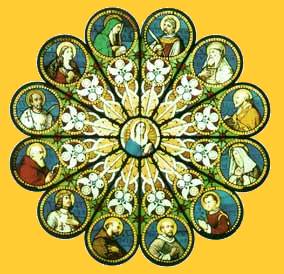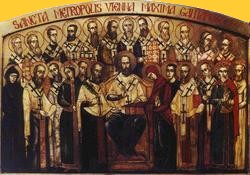

|
|
| Musical Musings: Solemnities |
Communion of SaintsTwo November Celebrations Help Us Remember Loved Ones Who Have DiedThis article appeared in the November-December 1996 edition of Catholic Heritage magazine, formerly published by Our Sunday Visitor, Inc. The magazine is no longer being published.
"Do not weep, for I shall be more useful to you after my death and I shall keep you then more effectively than during my life."
Every inch of wall space is filled with images of Father, Son, Spirit, Mary, angels, prophets and saints, as well as the citizens of earth and purgatory. Hell's residents are there, too, but they are not part of this communion. Awed by it all, we can sing with enthusiasm, "O blest communion, fellowship divine!" Every year on November 1 and 2 we celebrate All Saints' and All Souls' Days. In our worship, we consciously join ourselves to the saints in heaven and the souls in purgatory. Effectively, on these two days we put into practice our faith in the communion of saints. Why do we honor the saints in heaven? Why should they care about earthly attention when they have all the love they need from our heavenly Father? The saints do not need us to praise them. Our devotion adds nothing to what they already possess. If we venerate them, it is for our advantage, not theirs. Thoughts about the saints arouse within us a longing to be with God and to share in their company. Awareness of the saints awakens within us the urge to live in the company of the patriarchs, the assembly of prophets, the college of apostles, the fellowship of martyrs, confessors and all saints who have heard the call to absolute love and responded with enthusiastic faith. When we remember the saints in heaven, we are fired with another yearning: to practice the virtues that we see in their lives and to be filled with the life of Jesus just as they were. Recalling the saints reminds us of our ultimate destiny and our need for Christian living here on earth. On the other hand, when we pay attention to the souls in purgatory on All Souls' Day, we become aware that they need our loving attention and care during their time of purification. Our prayers and good works on earth can be offered on their behalf so that we can hasten them on their journey to eternal glory. It is only natural that we especially remember our relatives and friends who have died. However, we should also pray for those who have no one to remember them. In addition, the commemoration of All Souls' calls us to pause and to reflect on our own mortality. Death is a fact. It should motivate us to fill our lives with meaning and possibility, something we can best do by daily obedience to God's will for us while we live here on earth. Still, death is not the end of life, but a transition to a new life. The souls in purgatory (and those in glory) remind us of this truth of faith. 
The "communion of saints" refers to holy gifts (sacraments) and holy persons (the believers). Sancta sanctis! (God's holy gifts for God's holy people) is proclaimed by the celebrant in most Eastern liturgies during the elevation of the "Holy Gifts of the Eucharist" before the distribution of communion. The faithful (sancti) are fed by Christ's body and blood (sancta) to grow in the communion of the Holy Spirit and to communicate it to the world [See Cathechism of the Catholic Church, #948]. The Cathechism speaks of the communion of the saints first in terms of shared supernatural gifts and then as a community on earth, in purgatory and in heaven — all bound in grace and love by the will of the Father, the saving work of Christ and the active power of the Spirit. First, it is the holy gifts that bind us all together. We begin as a community of shared faith. Our faith leads us to the sacraments, ultimately to the Eucharist, which constantly makes possible our union with one another and God. "All the sacraments are sacred links uniting the faithful with one another and binding them to Jesus Christ, and above all baptism, by which we enter the Church." [Cathechism, #950]. The Holy Spirit further enriches our community by graces and gifts (also called "charisms") that help us to build up the Church and strengthen one another. In practical terms, we witness being a community of saints by sharing what we own with others, by eagerness to help the needy and the poor, and by being responsible stewards of the Lord's creation. Love constitutes the most powerful sign of our community awareness. We should live and love for one another. Our solidarity with all people, living and dead, is founded on the communion of saints. Even our smallest act of love benefits the whole Body of Christ. Flowing from this first teaching about the communion of saints is the truth that it is a community of people in the three states of the Church. "At the present time some of Christ's disciples are pilgrims on earth. Others have died and are being purified (in purgatory), while still others are in glory, contemplating in full light, God himself, triune and one, exactly as He is" [Cathechism, #954]. In this great community, the merciful love of God and his saints is always attentive to our prayers. The saints intercede with God on our behalf. Saint Thérèse of Lisieux (1873-1897) told us, "I want to spend my heaven doing good on earth." More vividly, she said she would let a "shower of roses" fall from heaven to earth. This is always done in union with the one mediator who is Christ. Our Blessed Mother Mary is especially powerful in asking her Son for graces we need. Pope John Paul II wrote, "Mary became not only 'nursing mother of the Son of Man,' but also an 'associate of unique nobility'" [Mother of the Redeemer, #39]. If we ask one another here on earth to pray for us, is it not even more logical to ask Mary and the saints to pray for us? In this communion of saints we pray for the souls in purgatory. "Our prayer for them is capable not only of helping them, but also of making their intercession for us effective" [Cathechism, #958]. All this means the communion of saints is one great family in Christ: those who are pilgrims on earth, the dead who are being purified, and the blessed in heaven, all together forming one Church. Norbertine Father Alfred McBride is the author of Essentials of the Faith: A Guide to the Catechism of the Catholic Church and Father McBride's Teen Catechism, both published by Our Sunday Visitor.
See CNP's Liturgical Planning Pages for
|
 The Sistine Chapel pictures the communion of saints for us.
Look up at the ceiling and behold God creating Adam in a cloud of heavenly glory.
The Sistine Chapel pictures the communion of saints for us.
Look up at the ceiling and behold God creating Adam in a cloud of heavenly glory.